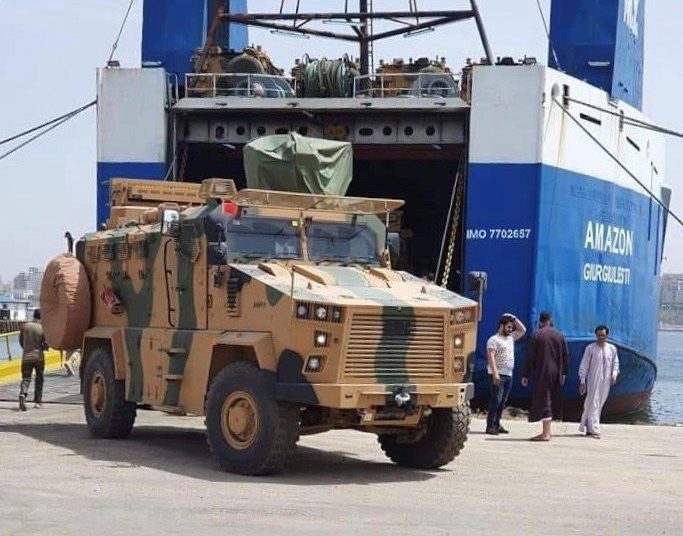Nordic Monitor
A recent security deal between Turkey and Libya’s Government of National Accord (GNA), which contradicts UN Security Council (UNSC) Resolution 1970, paves the way for systematic violation of UN sanctions imposed by the 2011 resolution. Following the signing of the agreement, President Recep Tayyip Erdoğan’s government stepped up illegal activities that are banned by the UNSC resolution.
The GNA and Ankara signed two key accords last month: one on security and military cooperation, and another on maritime boundaries in the eastern Mediterranean.
Despite a UN arms embargo, the Turkey-Libya Memorandum of Understanding (MoU), signed on November 27, 2019, allows the provision of training, consultancy, experience transfer, planning and material support by Turkey for the “establishment of [a] Quick Reaction Force covering the police and military responsibilities in Libya.” In accordance with the security deal, the GNA requested ground, air and sea support from Ankara.
Since then, the Turkish government has started preparations for the deployment of its troops in Libya while accelerating its operations to send Erdoğan’s private paramilitary units (SADAT) and jihadists to fight for the GNA. In December 2019 Turkey launched the transport of jihadists from Syria’s Idlib region to Libya and set up the legal basis for exporting its radical Islamist mercenaries to the North African country, international media reported.
UN Security Council Resolution 1970:
However, the MoU contravenes relevant parts (Paragraphs 9 and 10) of the UNSC resolution, which refer the situation (Paragraph 4) in Libya to the prosecutor of the International Criminal Court (ICC). The ICC thus may open an investigation into the MoU, into experts who took part in the negotiation process from both parties and the consequences of the deal in due course.
On the one hand, Paragraph 9 bans UN member states from “the direct or indirect supply, sale or transfer … of arms and related materiel of all types, including weapons and ammunition, military vehicles and equipment, paramilitary equipment, and spare parts for the aforementioned, and technical assistance, training, financial or other assistance, related to military activities or the provision, maintenance or use of any arms and related materiel, including the provision of armed mercenary personnel.”
On the other hand, according to Paragraph 10, Libya “shall cease the export of all arms and related materiel and Member States shall prohibit the procurement of such items from the Libyan Arab Jamahiriya by their nationals, or using their flagged vessels or aircraft …”
In addition to Resolution 1970 (2011), the Turkey-Libya security deal, allowing President Erdoğan to transfer paramilitary SADAT units and Idlib-based jihadists to Libya, also violates various UNSC resolutions including 2174 (2014) and 2213 (2015).
UNSC resolutions 2174 (2014) and 2213 (2015) stress the growing trend of terrorist groups in Libya to proclaim allegiance to the Islamic State in Iraq and Syria (ISIS); the continued presence of other al-Qaeda-linked terrorist organizations and individuals operating in Libya; and reaffirms the need to combat by all means and expresses the determination to use targeted sanctions in pursuit of stability, and against those individuals and entities who threaten stability in the country.

In 2011 the UN Panel of Experts on Libya was established pursuant to UNSC Resolution 1973 to monitor implementation of the measures and to designate those individuals subject to the measures imposed by Resolution 1970. The panel’s latest report, which was presented last month, identified multiple and routine military equipment (drones, armored vehicles, laser weapons and other arms and ammunition) shipments in 2019 from Turkey by Turkish authorities, companies and individuals in violation of UN Security Council Resolution 1970. Furthermore, the report revealed that Turkish support for the GNA includes not only arms shipments but also the training of military and police personnel.
The 376-page, December 2019 final report of the Panel of Experts on Libya established pursuant to Security Council Resolution 1973 (2011):
According to the report, the Presidency of the Defense Industry, (SSM) and Turkish companies such as BMC Otomotiv Sanayi ve Ticaret A.S.., Baykar Makina, Akdeniz Roro Deniz Tasimaciligi Turizm Sanayi ve Ticaret Limited Sti., ProAir-CharterTransport GmbH, Plures Air Cargo, Aykar Nakliyat, Bahriye Nur Karabilgin/Cem Gumrukleme Gida Silah Hiozm and Dis Tic were in non-compliance with Paragraph 9 of Resolution 1970 for their certain involvement in the procurement and physical transfer of military materiel to the GNA.
The UN report revealed that charter flights carrying weapons and military equipment obtained diplomatic clearance from the Ministry of Foreign Affairs of Turkey to fly to Misrata. This is unusual for a commercial flight, the report stated. The panel also underlined that Turkey had yet to respond to panel requests for clarification.

The Turkish defense industry is controlled by President Erdoğan and his family members, and the UN expert panel report took note of companies led by Erdoğan’s relatives or his close allies. For instance, Erdoğan’s son-in-law Selçuk Bayraktar, the chief technology officer of Baykar Makina, emerged as a leading private defense contractor following his wedding. Baykar Makina received government support to expand its output.
Moreover, Ethem Sancak, a businessman close to Erdoğan, has been transformed into an important figure of the Turkish defense industry after owning BMC in 2014. As seen in the UN report, both will be targeted by the UN sanctions due to their illegal activities in Libya.












